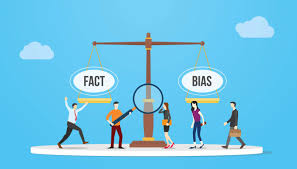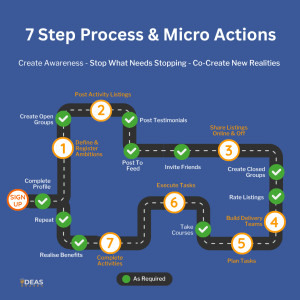Pausing Bias to Progress for the Common Good
Vote To Influence Outcomes
You must be logged in to rate.
Activity Details
The Challenge of Human Bias
Humans are naturally biased. We filter information, overvalue what feels familiar, and react emotionally to what threatens our worldview. In times of societal complexity - economic uncertainty, political division, or rapid technological change - these biases can stall progress, entrench conflict, and marginalise constructive voices.
Yet, if we can pause our biases, even for a moment, we open the door to collaboration, shared problem-solving, and collective advancement.
Why Bias Holds Us Back
Bias manifests in many ways:
>>> Confirmation bias: We seek out information that reinforces our beliefs, ignoring contrary evidence.
>>> Status quo bias: We resist change, even when the current system is failing.
>>> In-group bias: We favour those who look, think, or act like us, often at the expense of others.
>>> Negativity bias: We focus more on threats, failures, and risks than opportunities and solutions.
These tendencies prevent meaningful engagement and often leave the silent majority disempowered. Meanwhile, polarised, loud voices dominate, creating the illusion of consensus or societal momentum.
Constructive Pause: How to Step Back
Pausing bias is not about abandoning beliefs. It’s about creating space for reflection and objective assessment:
>>> Recognise your triggers: Notice when emotional reactions override rational thought.
>>> Seek diverse perspectives: Expose yourself to ideas, people, and experiences outside your comfort zone.
>>> Focus on shared outcomes: Prioritise solutions that benefit the many, not just yourself or your immediate circle.
>>> Question assumptions: Ask whether long-held beliefs are still relevant in today’s context.
>>> Measure impact, not opinion: Use evidence and measurable outcomes to guide decisions and actions.
This is the core principle behind Ideas-Shared: enabling structured collaboration that prioritises measurable progress over individual ego or noise.
Bias in Action: Common Pitfalls
When biases dominate, they appear as:
>>> Paralysis by analysis: Endless debate without action, often justified by the “right answer” that never materialises.
>>> Fragmentation of effort: People work in isolated silos, duplicating work, or missing opportunities to scale solutions.
>>> Short-term thinking: Prioritising immediate wins or gratification over sustainable, systemic impact.
>>> Discrediting the silent majority: Ignoring the contributions or potential of those who are quieter or less visible.
Pausing bias allows us to redirect energy from conflict to creation, from friction to progress.
Constructive Pathways Forward
Once bias is acknowledged and paused, collective progress becomes possible. Strategies include:
>>> Collaborative micro actions: Small, achievable steps that aggregate into substantial change.
>>> Transparent frameworks: Shared tools for mapping problems, tracking outcomes, and rewarding impact.
>>> Inclusive engagement: Lowering barriers so that the silent majority can participate without fear or intimidation.
>>> Iterative feedback loops: Measure results, learn quickly, and adjust approaches in real-time.
>>> Emphasis on logic over emotion: While emotions motivate, logic guides sustainable action.
Outcome: Ordinary people become empowered contributors, transforming systems from the ground up.
Why This Matters Now
Society faces unprecedented challenges: climate change, inequality, fractured governance, and a debt-driven global economy. Bias magnifies these challenges by keeping potential solutions dormant and sidelining capable participants.
By pausing bias, we:
>>> Enable cross-sector collaboration that combines diverse skills and perspectives.
>>> Reduce polarisation and destructive conflict.
>>> Increase social trust, making communities more resilient.
>>> Accelerate measurable progress in both local and global initiatives.
The silent majority, once activated, can reshape norms, influence institutions, and redefine what is possible.
The Role of Collective Tools
Platforms like Ideas-Shared exemplify how bias can be mitigated through structure:
>>> Structured ambition pathways: Guide individuals from idea to impact without reliance on visibility or status.
>>> Outcome-based frameworks: Encourage evidence-driven decision-making rather than opinion-driven debate.
>>> Universal access: Anyone can contribute, ensuring diverse perspectives are heard and acted upon.
This is not theory. It is a practical methodology to convert potential energy into collective action.
How to Change Society (Should We Wish To)...
>>> Pause your assumptions: Before judging, acting, or reacting, reflect on your own biases.
>>> Engage constructively: Seek solutions, not arguments.
>>> Act in micro steps: Small, consistent contributions compound into meaningful systemic change.
>>> Invite participation: Bring in those who are quiet, overlooked, or hesitant.
>>> Measure and share impact: Ensure progress is visible and inclusive.
Progress is possible when bias is recognised and suspended long enough to act collectively.
A Shared Future
Society doesn’t need more conflict, noise, or division. It needs calm, constructive action, driven by ordinary people who are empowered to make a difference.
By pausing bias and focusing on shared outcomes, the silent majority can awaken, collaborate, and reshape the systems that affect all of us.
The question is simple: Will you contribute to progress, or let bias dictate the next decades?



